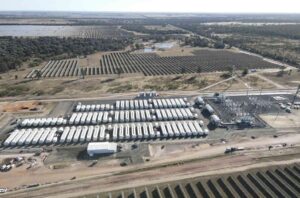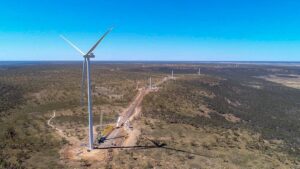Australia’s climate and energy policies remain in a state of chaos, and just a fortnight out from a major international climate conference, with some of the government’s most vigorous climate deniers to decide this weekend how far Australia should move on the path to net zero emissions.
On Friday, prime minister Scott Morrison announced he had confirmed his attendance at the COP26 climate talks in Glasgow, bowing to immense international and domestic pressure to attend.
Morrison did not say what policies he would take because – extraordinarily – they have yet to be decided.
On Sunday, the Nationals party room will effectively vote on what Australia’s new climate policies will be, with the group being asked to endorse a plan drafted by the Morrison cabinet.
The junior coalition partner has primarily been responsible for Australia’s international reputation as a climate action laggard – one so clearly advertised on a Times Square billboard on Friday morning – having used its power within the federal Coalition to oppose stronger emissions targets and support coal and gas.
Morrison is facing mounting pressure to, at the very least, commit to a net zero target by 2050, but also to announce stronger 2030 targets, with moderate Liberals such as Trent Zimmerman, Dave Sharma, Josh Frydenberg and Tim Wilson face serious election challenges from pro-climate action independent candidates.
It’s a fraught challenge for Morrison. Perceptions of doing too much on climate change, or too little, have responsible for ending the leadership of at least the last three prime ministers – and Morrison will be acutely aware of that fact when trying to navigate a deal with the Nationals.
On Friday, Morrison stressed that he saw net zero as an “outcome”, but that he remained more focused on the “how” rather than the “when”.
“I simply say to everyone that net zero was an outcome that I outlined at the beginning of this year, consistent with our Paris agreement,” Morrison said.
“The challenge is not about that ‘if’ and the ‘when’. It is about the ‘how’, and I am very focused about the ‘how’ because the global changes that are happening in our economy as a result of the response to climate change that have a real impact.”
“The plan that I am taking forward together with my colleagues is about ensuring that our regions are strong, that our region’s jobs are not only protected but have opportunities for the future.”
“It is not just about hitting net zero – that is an important environmental goal – what is important is that Australia’s economy goes from strength to strength.”
The language used by Morrison hints that perhaps an agreement on a definitive 2050 target may not have been landed. Morrison refused to say on Friday whether such a target was included in the plan being put to the Nationals.
But what Morrison did make clear is that he and federal energy minister Angus Taylor have offered a range of concessions to the Nationals, which are likely to include agreements to carve out the agricultural sector from any requirements to cut emissions, and commitments to further subsidise the resources industry.
Resources minister Keith Pitt has already demanded the creation of a $250 billion loan facility for the mining sector, which would see taxpayers step in as a ‘lender of last resort’ for mining projects deemed too risky to secure finance from Australian banks.
Joyce already appears to have secured an agreement for an extension of a proposed in-rail land link into Northern Queensland. The federal government is currently preparing to fund the construction of a new 1,700km freight railway link between Melbourne and Brisbane.
This week it emerged that Joyce had promised his Nationals colleagues that he had secured an agreement for the link to be extended to Gladstone in Northern Queensland, at an additional cost of $3 billion, to boost the amount of coal that can be exported from the Gladstone port.
Under active consideration are mechanisms that would suspend Australia’s climate targets if its deemed to have a detrimental impact on regional economies.
It is not a plan that is being designed based on the best scientific advice or the recommendations of leading policy experts – but rather what the Nationals think they will be able to sell to their constituents at a looming federal election.
It is a plan designed to win support from a group of Nationals parliamentarians that include Barnaby Joyce, Matt Canavan, George Christiansen, Bridget McKenzie and Keith Pitt.
This is a group of parliamentarians who decided to roll the previous Nationals leader, Michael McCormack, because they thought he was going to sign up to a zero emissions target.
After the Nationals consider the plan on Sunday, it will be considered by the joint Liberal-National party room for formal adoption as the Coalition’s climate policy.
Without the approval of the Nationals, any such plan is unlikely to have any real prospect of also being successfully adopted by the Liberal party, which cannot pass legislation on its own accord.
It is being reported that there will be an emergency meeting of the Liberal party room on Monday morning to discuss the climate plan before a meeting of the joint Liberal-National caucus on Tuesday.
https://twitter.com/jenbechwati/status/1448823859289853955
Commenting on the developments, Labor’s shadow minister for energy and climate, Chris Bowen, said that Morrison was putting the interests of the Nationals ahead of the interests of the nation.
“Scott Morrison is dithering and Australians are paying the price. Scott Morrison’s Government is not up to it. He is showing every day that he is unfit to govern in the national interest because he’s betraying the national interest because he’s acting on the National Party interest, not the national interest. That’s what Scott Morrison is doing,” Bowen said on Friday.
Next week, we’ll know whether Morrison and the Nationals have heeded the calls of business groups, investors, scientists, environmental groups, and Australia’s major international peers.






